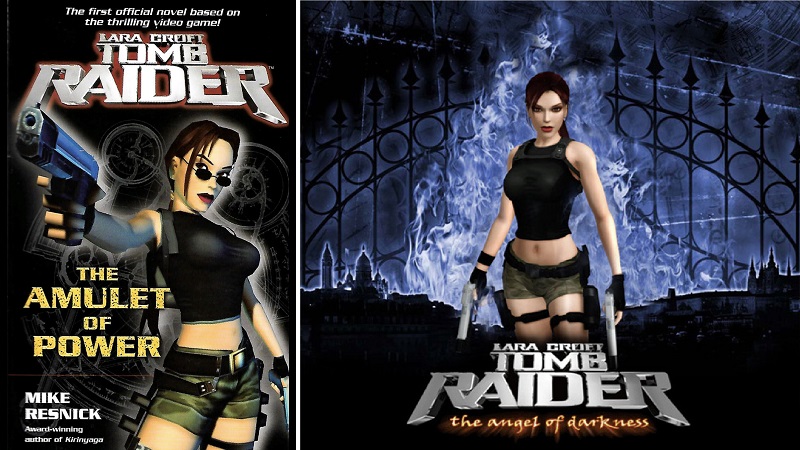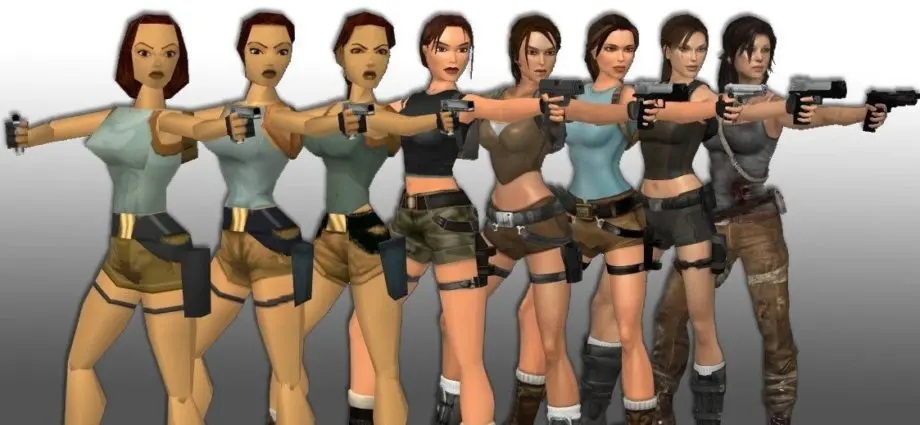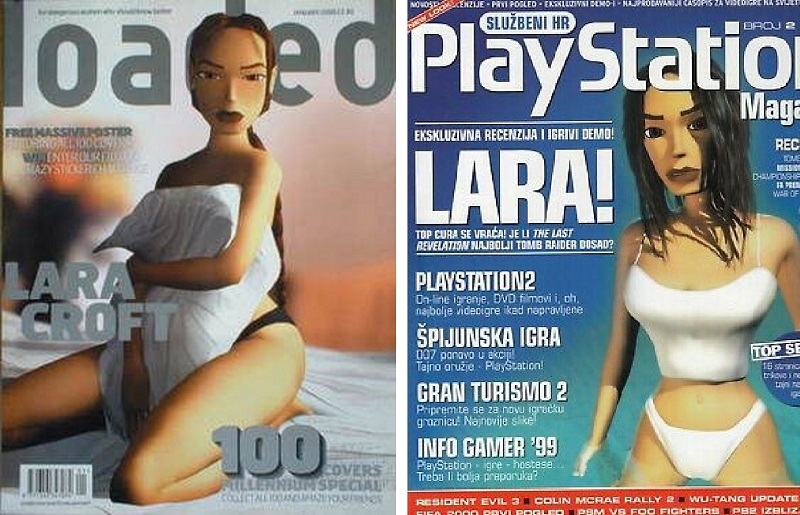Lara Croft: Tomb Raider: The Amulet of Power
Mike Resnick, 2003
Lara's Evolution
The first Tomb Raider book is set in between the fourth and sixth games (the fifth game Tomb Raider: Chronicles, being flashbacks to Lara’s past), but you don’t need to know any of that for the book. It was marketed as a story that ties the games together, but in fact the only reference is on the first page and then in an epilogue in which the author mistakes the villain of the games for someone Lara cares about. Everything in between is inconsequential, and even contradicts the games canon. Before we take a look at the problems of how a real-world sex-symbol is written in the 2000s (spoilers, it's not good), it might be helpful to provide some context of the tone of these games.
This first book came out seven years after the original game, since when Lara had evolved considerably. In the first game she is a blank slate, an almost silent protagonist whose attributes are assumed via her puzzle solving, acrobatics and gunplay. Meanwhile the cut-scenes and promotional material depict her as an wise-cracking action hero. Lara was quite reserved in the dialogue in Tomb Raider II, talking you around her mansion. By the fourth game, the series moved away from the original trilogy and started to upgrade the engine and expand the backstory, number of voiced lines and the action abilities of Lara, getting more bombastic every year. In the same year as the book, the sixth game Angel of Darkness was released, aiming for a darker, more gritty tone for Lara.

Even more relevant is the Tomb Raider movie from 2001, depicting the cliched, wise-cracking action version of Lara. Reviews of the Angelina Jolie movies at the time were generally bad, and Lara is depicted as a generally arrogant badass. Perhaps we all thought it was rebellious and cool in the early 2000s, but 20 years later it’s quite unsympathetic. Indiana Jones, on which Tomb Raider was explicitly based, can be problematic for many reasons in retrospect, but just comparing the characters, he wasn’t written as a horrible person. In fact it was a feature of the films that he was regularly brought back down to Earth with a bump whenever he got too arrogant, to the amusement of the audience. Not so for Lara, who’s unlikeable character traits and arrogance go unchecked throughout this book.
The Macguffin
We start off in Egypt, often associated with archaeology and mystical tombs. We’re immediately introduced to Lara's love interest. We are informed that some mysterious baddies are after Lara, who is in hospital injured after raiding a tomb. So far so good.
Lara, as well as the baddies, seeks the Amulet of Mareish, a rather generic trinket that grants the wearer immortality and a vague general power, which was hidden in the 1800s. There isn’t much of a puzzle to find it so do have to you wonder why the bad guys are still searching for it after a hundred years. Lara has to read some books, have a think and that that’s about it. No intricate stone carvings to decipher or ancient riddles to solve.
Out to stop Lara are a group of bad guys constantly attacking her to stop her finding the amulet. Another group of bad guys want Lara to find it, and then kill her, although despite not wanting to kill her yet they too are constantly attacking her throughout the book. Don’t think about it too much.

So at the hospital, Lara fends off the first of hundreds of attacks, and off she goes with her new friend on their adventure.
The author has written many books based around his travels in Africa and is obviously very knowledgeable about the continent, which is a positive and adds a lot of flavour to the places they travel. Perhaps that’s why they never stop travelling throughout the book, only staying in one place for about a chapter. I would estimate 90% of the book is them travelling while fending off attacks, and the other 10% is them staying in a hotel while fending off attacks.
To give you an idea how bad this gets, other noteworthy events that happen multiple times in the book is fruit being sabotaged (bad dates), and dangerous animals being planted in a room to kill Lara. Yes, among many other types of attack launched at Lara, both of these things happen more than once. It’s weird.
Later on, the repetitive attacks in the hotel rooms come to a tremendous climax when Lara finds her friend dying in her room. He informs her that while she was gone he had been shot by one group of attackers who promptly left, after which he was stabbed by the second group of attackers, who also then left (perhaps to allow a third group of attackers to come and give him a pie in the face?). It would have been an emotional moment were it not hilarious.
Overall it’s more James Bond than Tomb Raider or Indiana Jones. It’s similar in tone to the Tomb Raider movies of the 2000s although at least tombs were raided in the movies, and there was a nod towards some archaeology or solving of mysteries. It’s also open with the supernatural side of things from the beginning, with sand monsters and other magical goings-on. This is fair enough, the older games were outlandish with the supernatural monsters and so on, so there’s no supernatural fence-sitting here as there is in Indiana Jones or in the 2013 ‘survivor’ era of Tomb Raider games.
The ending is in line with the rest of the book, if it wasn’t for its storytelling and main character problems it would be a fairly standard adventure novel, although not one that feels at all like Tomb Raider games. In fact the only tomb being raided or even referred to was before the story had even begun.
The characters are fine, the two main Western companions for Lara are nearly the same person, and there is a small team of friends who help her around Africa, Omar being a nice guy and serving the plot. The main character, though, is where the problem lies.
The Unlikeable Lara Croft
Lara is the reason you’re reading the book, indeed they prefixed a “Lara Croft” to the Tomb Raider title, and throughout this book she is very unlikable. This is not the more subtle Lara from the Keeley Hawes voiced games or the weirdly victimised Lara from 'survivor' period.
With her inherited wealth, being famous and at the top of her field, you might think an effort may be made to make her relatable to the audience. This does not happen. She can do everything better than everyone else, knows all languages and is an expert in everything. She is strong and athletic, as well as a military-level expert sharpshooter (in fact, she literally trains with the military and shows them up in the beginning of the next book). No reason is given for any of this; there is no history of military service and spy training of James Bond, nor the years of academic and linguistic studies of Indiana Jones. She doesn’t have the character flaws of either of those characters which are exploited to dramatic or comedic effect and it becomes a problem for this book. For example, story exposition often comes from an expert explaining the background of the story to a layperson. Lara knows everything, and her only companions are experts in the field. So when the reader needs to learn the story of the amulet, they are treated to two experts repeatedly telling each other they already know the history, yet continuing to talk about it for about 4 or 5 pages. It doesn't make any sense.
Lara is simply perfect, and arrogant about it too. It really adds to her unlikeability, like a trust-fund kid you might have known at college. To demonstrate this early on in the book: she is rude to a waiter. Jokes aside, it’s quite a distasteful scene mixing the weird sexism stuff that we will discuss later, with seemingly a sprinkle of old colonial attitudes, before she threatens to kill him. Let me explain.
In rural Egypt, a waiter says he won't serve an unescorted woman, meanwhile some other male diners sneer at Lara for being in a restaurant alone and dressed as she is. Ok I'm still on board. Her rebellion against this attitude is again supposed to show her refusal to be treated as anything less than an equal, which is admirable. Indiana Jones had similar problems of being a superior "great white saviour" in the 80s, but he was shown to respect the customs of whichever country he was in so as to paint him as both an enlightened academic and an experienced traveller. There was no scene of him insulting the food and water quality of a developing country. After pulling her gun on the waiter and insulting the food they are able to provide in rural Egypt:
“Bring me some water.”
“Yes, ma’am,” said the waiter, turning to leave.
“Just a moment,” she said sharply. He froze in his tracks, then turned to her. “I know better than to drink from the Nile if there’s any alternative. I want you to boil the water, then pour some in a cup and put a tea bag in it.”
“We don’t have any tea bags.”
She cocked the pistol. “You’ll find one.”
He gulped. “I will find one.”
“How very thoughtful of you,” she said, twirling the gun and replacing it in her holsters
It’s that trust-fund kid again from college again. She then laments all the "strange" and disgusting food she has eaten on her adventures. Should she have accepted sexist customs? Maybe not, but I'm not sure being racist is the answer and I'm not sure the sexism was the point of this scene rather than showing her being edgy. Later, in Sudan, she goes to an exclusive British private club to eat breakfast while her Sudanese friends wait outside, and tricks the Muslim chef into cooking pork.
Even worse for the book than the unlikeability of the main character, her superhuman abilities remove any and all tension from dramatic situations. It is ridiculous how many times throughout the book the author has written themselves into a corner and needs to give some explicit reasons why she forgot/lost/had stolen/left behind/can’t access her pistols, because otherwise there is no chance anyone could endanger her. It’s like a modern filmmaker inserting the requisite “My phone has no signal/battery!” dialogue at the beginning of every scene so they can’t phone for help. On the subject of Lara’s often-left-behind guns, they are mentioned a lot. During this book and this book only, they are a fictional make called Black Demon .32s and regularly referred to as such, presumably because it sounds edgy.
This is never mentioned anywhere else in Tomb Raider and while dual pistols were an iconic look for Lara, the games have never been gun-porn, and the weaponry is just a tool for getting to the end of the level.

It Gets Worse
Unfortunately, Lara's unlikeability also extends to the constant mention of sexism. Warning, I’m not an expert on any of this, but it’s impossible to discuss the book without mentioning it as it runs all the way through. Lara’s constant battle against sexism is positive, but the tone is always belligerent and it crops up during odd moments. No discussion or mention of sexist issues is made at all, it's included exclusively via a woman complaining about it. I’m not sure this is a very positive way to present it to a target audience of young males. Worse, after arguing about something she deems sexist, she regularly then apologises for overreacting.
If I was being uncharitable, I would say this is how someone who does not like feminists might portray a feminist: as a woman who constantly complains about sexism and brings it up out of nowhere, who then apologises for getting hysterical. So who is portraying Lara here?
Author Mike Resnick is a highly decorated sci-fi author, winning 5 Hugo awards. After the constant, oddly forced dialogue around Lara’s beauty and gender, I had to Google him. According to Wikipedia:
“In the 1960s and early 1970s, Resnick “wrote over 200 erotic adult novels […] and edited three men's magazines and seven tabloid newspapers.”
That was a long time ago in fairness, but in retrospect perhaps this was not the right person to write a female main character. Then again, In 2003 Lara was only just progressing from sexy action hero into something more three-dimensional, so perhaps this tone was intended.
A quick Google brings up this 2013 controversy and this 2020 follow-up article in which Resnick is criticised for an article discussing specific female writers and how physically attractive they were for some reason. According to that second article, Resnick and the other author published a rebuttal to the outcry, claiming censorship, and the whole ordeal led to the resignation of the editor.
Maybe this provides some context for the inconsistent and clumsy dialogue around the fact Lara is a woman. I don’t know, and I have not read any other of his books, so you can do with that information as you wish. The apparent progressiveness is also accompanied by constant mentions of her body and beauty no matter what’s going on in the scene. And then there’s things like this:
”Any other woman, or even a strong man, could not do what she has done in the last two days.”
Many times in the book it's highlighted that Lara is very capable because she is an exception, all other women of course still remaining frail and incapable. At one point she is supposed to wear a disguise to avoid a band of killers who are hunting them. When she bizarrely refuses to disguise herself from assassins, it’s pointed out that she would stand out in a crowd because the local women cover themselves. Lara protests, and she mentions that she doesn’t want to cover up her body while local women in Sudan are expected to, saying:
“Fine! Get a Sudanese woman to find your amulet.”
I really don’t know how to interpret that. Is she quite happy for local women to be subjugated, while also pointing out that other women aren't capable? It’s weird.
Perhaps I’m flogging a dead horse here, I don’t think anyone expected a Lara Croft novel written by a 60 year old man in 2003 to be a bastion of equality. Indeed perhaps it’s not all pinned on the author, Lara was sexualised and pushed to appeal to teenage boys from the very beginning, a strategy pushed by the Eidos marketing department rather than her creators, depending on who you believe.
It’s not a good book, not even some cheap and cheerful fun like the Indiana Jones novels. So many tropes are repeated so quickly, so many times, your head will spin by the end. Happily, in the later games, books, and even the later 2018 film, Lara is a much more three-dimensional character, and isn’t seemingly deliberately written to be unlikeable.
Most importantly, she is never again rude to people working in the service industry.

All book posts:
© P7uen 2023 | Base style css by EGGRAMEN 2020